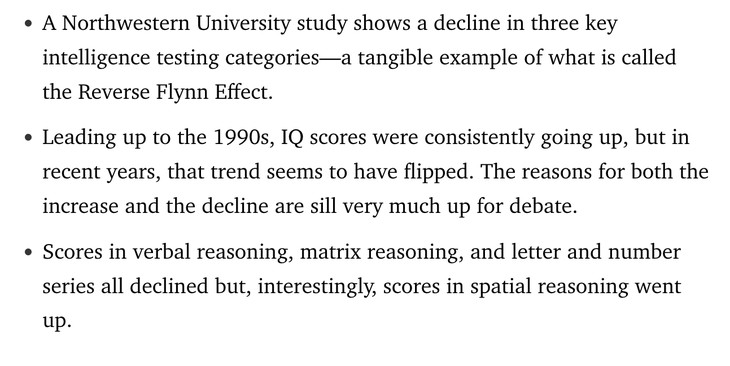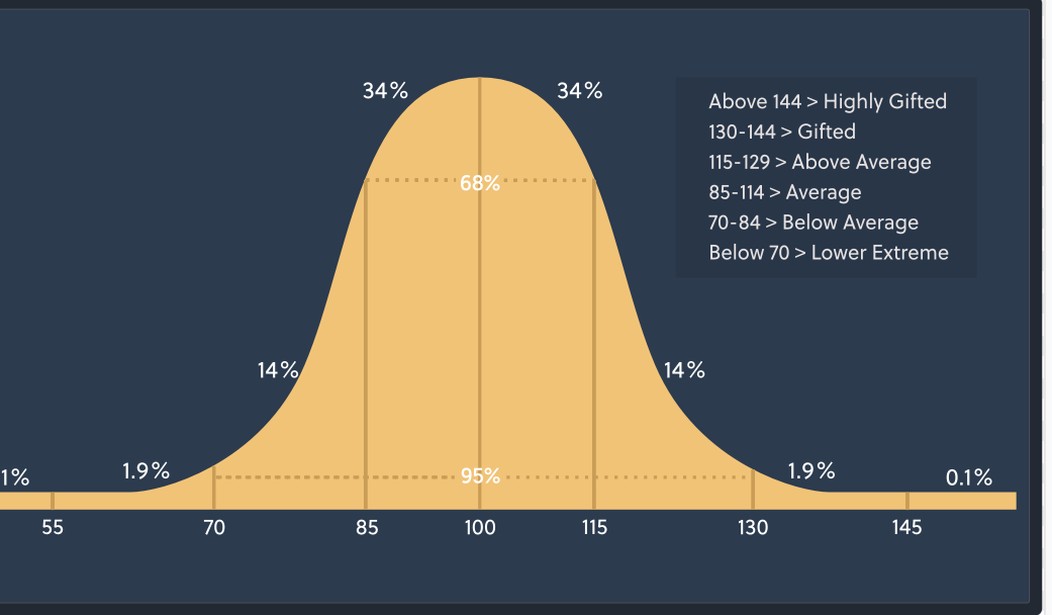For decades IQs were climbing in the Western World. It was called the “Flynn effect.”
Average IQs were defined as 100 in each succeeding iteration of the IQ test, as by definition the average was normed to 100. But if you rescored earlier IQ tests based upon prior norms, the average IQ would have increased by about 15 points or one standard deviation.
In other words, if you took an IQ test in 1942 and scored 100, by today’s scoring you would have an IQ of 86.
That is, until the past 10 or so years. In the past 10 years, IQs have been dropping, and dropping pretty fast. And nobody is quite sure why. It is labeled the “Reverse Flynn Effect.”
There is lively debate about what exactly the Flynn effect and now the Reverse Flynn effect exactly mean. It could be something as simple as differences in education or education styles or something physical such as the effects of nutrition, as diets change over time. There could have been something that stimulated logic and reading abilities in the past and that no longer exists, or something else.
But the fact is that improvements in IQ over time are being erased.

Americans’ IQ scores are trending in a downward direction. In fact, they’ve been falling for over a decade.
According to a press release, in studying intelligence testing data from 2006 to 2018, Northwestern University researchers noticed that test scores in three out of four “cognitive domains” were going down. This is the first time we’ve seen a consistent negative slope for these testing categories, providing tangible evidence of what is known as the “Reverse Flynn Effect.”
In a 1984 study, James Flynn noticed that intelligence test scores had steadily increased since the early 1930s. We call that steady rise the Flynn Effect. Considering that overall intelligence seemed to be increasing faster than could be explained by evolution, the reason increase became a source of debate, with many attributing the change to various environmental factors.
One interesting clue is the fact that of the 4 domains of intelligence measured only 3 of the four have gone down, while the 4th–spacial reasoning–continued to rise.
Almost sounds like playing video games a lot dumbs down the verbal and logic abilities while increasing spatial reasoning. That is my favorite explanation.
Schools, too, have stopped emphasizing logic and reading and gone deep into ideological propaganda. The simplest conversation with a newly graduated student reveals their utter inability to reason coherently on almost any matter or use the English language as a sophisticated communication tool.
Hence the inability to define simple terms such as sex, or answer the question “what is a woman.”
We know that exposure to sophisticated concepts and reading matter a lot, particularly at the early stages of brain development. With the reduced emphasis on reading and logic skills and the enhanced ability to consume endless amounts of simple content–usually in very small bites–it wouldn’t be surprising to see the ability of younger people to exercise more sophisticated abilities.
Of course, this is speculation on my part.
Dworak, a research assistant professor at Northwestern University and one of the authors on the study, is very clear that these results don’t necessarily mean Americans are getting less intelligent. “It doesn’t mean their mental ability is lower or higher; it’s just a difference in scores that are favoring older or newer samples,” she said in a press release. “It could just be that they’re getting worse at taking tests or specifically worse at taking these kinds of tests.”
And, it should be said, there has long been debate over how accurately IQ tests are able to gauge overall intelligence and potential for success in society in the first place.
Regardless, scores are falling, and there’s got to be a reason for the decline. Dworak says it might have something to do with “a shift in perceived values in society.” She offers up the potential explanation that an increase in focus on STEM education may have allowed other areas, like abstract reasoning, to fall by the wayside.
I don’t buy that society is becoming more focused on STEM. We talk a lot about it, but STEM scores are pretty dismal in the schools, and STEM itself is becoming ideological.
It would be interesting to see what would happen if you sliced and diced the population in order to tease out some more sophisticated correlations. Race, income, type of school, hours on the Internet, content consumption habits, parenting styles.
I suspect we could learn a lot. And given the size of the data sample, I suspect that the studies could easily be done, or even have been done and the results not widely distributed for political reasons.
But again, that latter is just speculation. It may be that the variables simply weren’t recorded.
In any case, the fact remains: something bad is going on here. I think we have all seen the effects in our personal experiences, and now the anecdotal impressions have data to back them up.








Join the conversation as a VIP Member